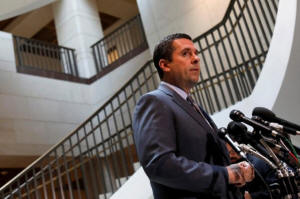|
Lawmaker says U.S. foreign surveillance
'unmasked' Trump associates
 Send a link to a friend
Send a link to a friend
 [March 23, 2017]
By Patricia Zengerle and Dustin Volz [March 23, 2017]
By Patricia Zengerle and Dustin Volz
WASHINGTON (Reuters) - The Republican
chairman of the U.S. House of Representatives intelligence committee set
off a political firestorm on Wednesday when he said the communications
of members of Donald Trump's transition team were caught up in
incidental surveillance targeting foreigners.
Representative Devin Nunes said at a news conference that it was
possible President Trump's own communications were also intercepted and
disseminated among U.S. intelligence agencies.
The White House seized on Nunes' remarks, which had cited anonymous
sources, to bolster Trump's unproven assertion that former President
Barack Obama's administration spied on the incoming president. Nunes
himself said there is no proof of that, as have other lawmakers of both
parties and the FBI director.
A short while later, Trump spokesman Sean Spicer cited Nunes' comments
at his White House news briefing.
"I do think it is a startling revelation, and there's a lot of questions
that need to get asked," Spicer said.
Democrats denounced Nunes' statements as highly unusual from the
chairman of an intelligence committee, with the top Democrat on the
committee saying its members had not been informed and implying that
Nunes was giving political cover to the president.
Intelligence reports about the communications appeared to "unmask" the
identity of the Trump associates and the names were widely shared among
the agencies, Nunes said. He said it was possible Trump's own
communications were also collected.

The National Security Agency routinely collects electronic
communications on foreigners through a variety of surveillance tools.
But information about Americans is also sometimes incidentally gathered,
such as when someone is communicating to a foreign target.
Typically the names of Americans are made anonymous, or masked, in
foreign intelligence reports unless an intelligence agency determines
the identity of that person is relevant to national security or a
criminal investigation. It was unclear why the reports Nunes cited
contained unmasked names.
A U.S. government source said it was logical, if not normal, that
communications from Trump aides would have been incidentally intercepted
by U.S. agencies after his election, given that they would have an
interest in talking to foreign governments. Trump took office on Jan.
20.
Two days ago, the director of the Federal Bureau of Investigation, James
Comey, told a hearing of Nunes' committee that his agency was conducting
a criminal investigation of potential links between Trump associates and
Russia's attempts to influence the 2016 U.S. election to benefit Trump.
"I recently confirmed that on numerous occasions the intelligence
community ... collected information about U.S. citizens involved in the
Trump transition," said Nunes, who was himself on Trump's transition
team.
Nunes said he was referring to intelligence reports of communications
collected under the Foreign Intelligence Surveillance Act.
"I want to be clear, none of this surveillance was related to Russia or
the investigation of Russian activities or of the Trump team," he said.
Trump said he felt "somewhat" vindicated by Nunes' announcement after
being briefed by Nunes. FBI head Comey on Monday said that Trump's
claims were groundless.
According to Nunes, the conversations in question were collected legally
in November, December and January.
In an interview with CNN, the committee's leading Democrat, Adam Schiff
said, "The chairman will need to decide whether he is the chairman of an
independent investigation into conduct which includes allegations of
potential coordination between the Trump campaign and the Russians, or
he's going to act as a surrogate of the White House, because he cannot
do both."
[to top of second column] |

House Permanent Select Committee on Intelligence Chairman Devin
Nunes (R-CA) speaks to the media on Capitol Hill in Washington March
7, 2017. REUTERS/Aaron P. Bernstein

Nunes' remarks appeared tied to a line of questioning from
Republicans during Monday's hearing about the importance of
identifying and prosecuting those responsible for intelligence
leaks.
Republicans have focused much of their discussion of the issue on
the release of the names, or "unmasking" of Trump associates in the
investigation. Trump fired his former national security adviser,
General Mike Flynn, after the revelation that he had spoken to
Russian Ambassador Sergei Kislyak, during the transition - which was
leaked to the press after those calls were caught by surveillance
intercepts.
Nunes appeared to suggest intelligence reports about intercepts
other than Flynn's conversations existed.
'PROFOUND IRREGULARITY'
Former intelligence officials and Democrats said Nunes' announcement
was highly unusual from the chairman of an intelligence committee.
Schiff said he was not consulted by Nunes before his news
conference. Nunes' decision to share the information with the White
House before informing the committee was a "profound irregularity,"
Schiff said, adding that "a credible investigation cannot be
conducted this way."
Schiff said the unmasking of a U.S. person may be appropriate in the
context of an investigation.
U.S. intelligence agencies have accused Russia of seeking to
influence the presidential election in Trump's favor against
Democratic candidate Hillary Clinton by hacking computer systems and
spreading disinformation. Russia denies the allegations.
Nunes said he was "very concerned" about whether U.S. intelligence
agencies were spying on Trump. He briefed Republican House Speaker
Paul Ryan before the news conference and went to the White House to
share the information.
Admiral Mike Rogers, the director of the National Security Agency,
was asked by Republicans at Monday's hearing about the agency's
policies for "unmasking" the names of Americans whose communications
were incidentally collected under foreign surveillance programs.


Rogers said that 20 NSA employees, including himself, have the
authority to unmask the identity of an Americanís communications,
and that senior officials at the CIA, FBI and Justice Department can
make such a request. Asked how many Americans had been unmasked
since June 2016, Rogers said he did not know.
(Reporting by Patricia Zengerle and Dustin Volz, additional
reporting by Doina Chiacu, David Alexander, Mark Hosenball and Tim
Ahmann; editing by John Walcott and Grant McCool)
[© 2017 Thomson Reuters. All rights
reserved.]
Copyright 2017 Reuters. All rights reserved. This material may not be published,
broadcast, rewritten or redistributed. |